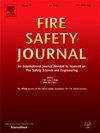Effects of oil phase alkanes on the fire extinguishing efficiency of ferrocene-containing O/W microemulsions
Abstract
This study explored the effects of oil phase n-alkane on the emulsion properties and fire suppression ability of n-alkane/water microemulsions containing ferrocene. We used n-pentane, n-heptane, and n-decane as the oil-phase n-alkanes; the microemulsions were prepared according to the agent-in-water technique using Noigen TDS-80 as a surfactant. Emulsion stability testing and dynamic light scattering measurements demonstrated that the n-decane/water systems were thermodynamically unstable macroemulsions, whereas the n-pentane/water and n-heptane/water systems were thermodynamically stable microemulsions. Fire suppression trials proved that (i) most of the n-pentane/water and n-heptane/water microemulsions had an extinguishing probability of 1.0, (ii) their suppression ability was ranked as follows: the n-pentane/water microemulsions > the n-heptane/water microemulsions ≫ the decane/water macroemulsions; and (iii) the optimum concentration of ferrocene was 100 ppm. The suppression ability of the microemulsions is attributed to the radical scavenging efficiency in flames and the ease with which ferrocene in the microemulsions is released. The findings of this research suggest that the use of an n-alkane with a low boiling point significantly increases the suppression ability of a microemulsion. An outstanding advantage of microemulsions is that even highly lipophilic substances can be employed as additives to water mists, suggesting that the microemulsificaiton approach widens water mist additive options.

 求助内容:
求助内容: 应助结果提醒方式:
应助结果提醒方式:


